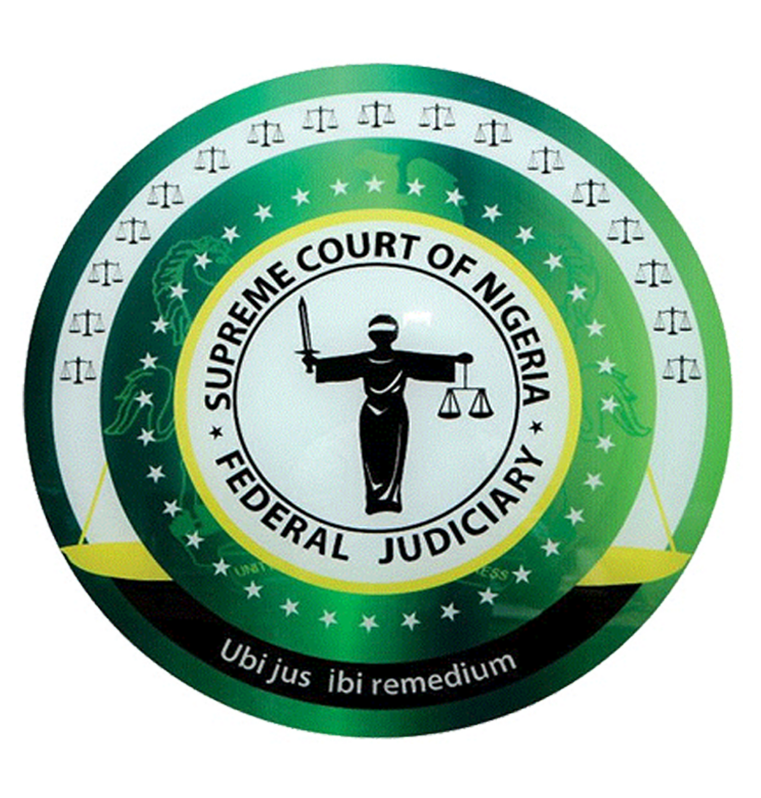Whilst it is yet to fully recover from the fatal blow dealt to its reputation for the better part of last year, the Supreme Court of Nigeria, it would appear, is on the course of a new, and hopefully, glorious future.
Assuming the current negative perception of many Nigerians, of the court were to be under suspicion of being coloured by one form of prejudice or the other, those would have been allayed by the very indicting judgment of no less a person, than a foremost jurist of that court, the Hon. Mr Justice Musa Dattijo Muhammad (rtd) who took the auspicious occasion of his retirement from the Hallowed Court, last year, to tell the court how much it stinks.
From allegations of corruption both in the administration of the court and determination of cases before it, particularly political cases, the Supreme Court had come under a serious credibility crisis so much so that it took something of a mutiny by members of the court to sack its immediate former leadership – Hon. Mr. Justice Ibrahim Tanko Mohammed, who quit the court in circumstances that are yet to be fully unravelled.
And so, on Monday, when the Chief Justice of Nigeria, Hon. Justice Olukayode Ariwoola, administered the ceremonial oath of office to 11 new Justices of the Court, there was a sense in which it may be said that the Supreme Court is set for a new future.
Monday’s event was historic on many levels. For starters, it would be the first time we would have a full complement of the court comprising 22 Justices in line with Constitutional prescriptions. Until Monday, the most we have had of members of that court per time, was 20; which, unfortunately, was unimaginably depleted in swift turn of events, comprising the death of serving justices of the court and mandatory statutory retirement thereby bringing its membership to an all-time-low of 10 Justices until yesterday’s event.
The Supreme Court of any nation is a very critical institution and, in a democracy, it is emblematic of the democratic tradition. It is not just a court of law, but also a policy court with the potential of shaping the socio-economic and socio-cultural wellbeing of the society it serves. The Nigerian Supreme Court is not an exception, at least in principle. However, the structure of the court, it would appear, has been its albatross.
According to many serving and retired justices of the court, as well as notable academics, Justices of the Supreme Court of Nigeria, are arguably the most over-worked amongst their peers elsewhere; a theory which finds an unfortunate validation in the mortality rate of serving justices of the court in recent years.
As an appellate court with country-wide appellate jurisdiction, the Supreme Court entertains all manner of appeals; including the frivolous ones which should have no business being engaged by the court. The incredulity of the jurisdictional ambit of the court was summed up by Justice Amina Adamu Augie, last, year, who at her valedictory told of how the court, one day, presided over an appeal involving 12 burnt goats, at the instance of the State. Added to its original jurisdiction and appellate jurisdiction in pre-election, governorship and presidential election appeals, the enormous responsibility of members of the court can only be better imagined.
It was under this climate, therefore, that the clamour for a full constitution of the court was predicated until such strident cries were heeded by President Ahmed Bola Tinubu who last year, nominated the Justices who took the sacred oath yesterday.
It is, therefore, not surprising that the immediate expectations of many legal practitioners and indeed the general public, of yesterday’s event, is the increase in the determination of justice quotient of the court. As of today, a civil case at the Supreme Court takes an average of ten (10) years before it is determined to finality; whilst their criminal counterpart hovers between three and five years. With this recently extended manpower of the court, one expects, at the minimum, a reasonable reduction in the average years for the determination of cases at the Supreme Court.
Yet, a mere increase in the number of Justices of the Court will not cure all the problems that have conduced to protracted delays in the determination of cases at the court. There is a need for a revisiting of the jurisdictional ambit of the court in order to make it indeed, a policy court. A situation where the Supreme Court of Nigeria still has appellate jurisdiction over Landlord and Tenancy matters is totally unacceptable.
Also, it must be said that the role of lawyers in clogging the court with frivolous appeals that ordinarily should not find its way at such high adjudicatory altitude has also contributed to making our Supreme Court, anything but Supreme. In recent years, the court has reacted by mulcting such counsel at substantial cost. Whether such costs are often paid, is the subject of another day’s discussion.
All said and done, there is a sense in which it may be said that a bright future opens yet again for our Supreme Court. The latest infusion of life and zest in the court must find meaning in the quality of adjudication henceforth from the Court at the very minimum.
The gale of conflicting decisions of the court, especially in political cases, must answer to the constitution of a special panel of the court by the Chief Justice which panel would be tasked with the mandate of harmonising our legal jurisprudence on many fronts with a view to arriving at certainty in the law- which is the most intrinsic character of law.
Having attained the pinnacles of their judicial career, it is only fitting to congratulate the newly-minted justices of the court. But they must know that they are coming to the court at a time when it is under enormous suspicion from the public which it serves. I would think, that this places a great moral burden on them to help to improve the image of the court in the public perception. There is no better way to do this, than by approaching their very sacred mandates within the province of their oath of office by delivering justice to all manner of men, without fear, ill will or favour.
Nkannebe, a Senior Associate at Ken Ahia, SAN & Associates, can be reached via raymond@kenahialaw.com

 Join Daily Trust WhatsApp Community For Quick Access To News and Happenings Around You.
Join Daily Trust WhatsApp Community For Quick Access To News and Happenings Around You.


